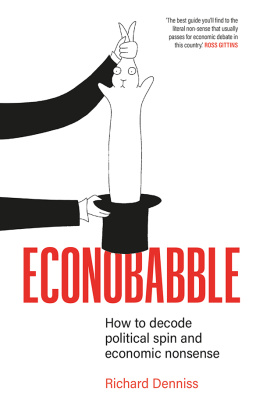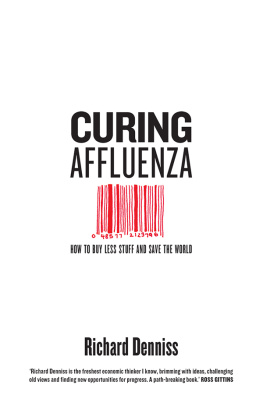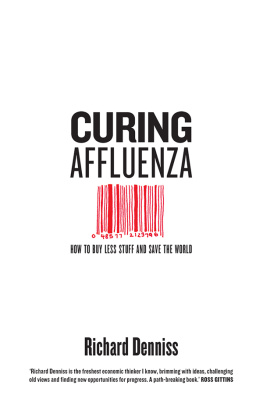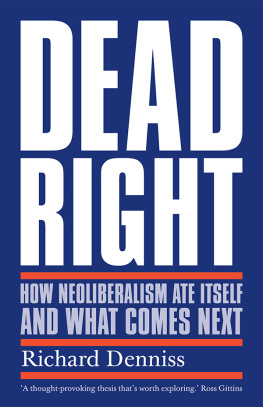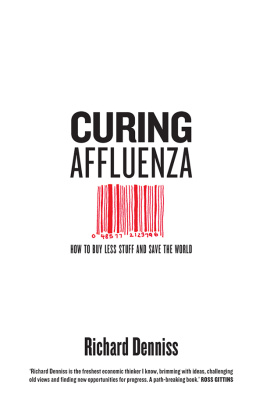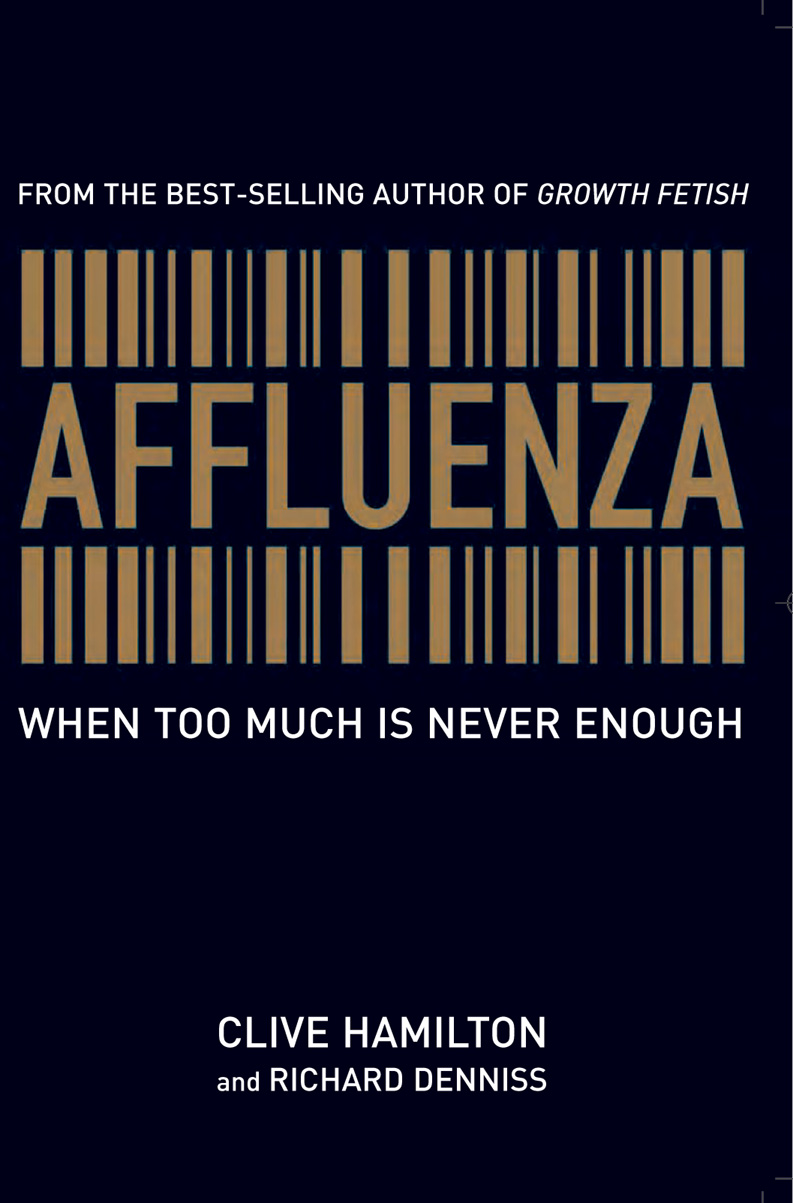
Clive Hamilton is the author of
Growth Fetish and Executive Director of the Australia Institute,Australias foremost public interest think tank. Described as Australias most amazing economist, he has held visiting positions at the Australian National University, the University of Sydney and the University of Cambridge.

Richard Denniss is Deputy Director of the Australia Institute. He has taught economics at the
University of Newcastle, was Chief of Staff to Senator Natasha Stott Despoja and has published widely on the impact of government policy on society and the environment.
Af-flu-en-za (n). 1. The bloated, sluggish and unfulfilled feeling that results from efforts to keep up with the Joneses. 2. An epidemic of stress, overwork, waste and indebtedness caused by dogged pursuit of the Australian dream. 3. An unsustainable addiction to economic growth.
FROM THE BEST-SELLING AUTHOR OF GROWTH FETISH
AFFLUENZA
WHEN TOO MUCH IS NEVER ENOUGH
CLIVE HAMILTON
and RICHARD DENNISS

First published in 2005
Copyright Clive Hamilton and Richard Denniss 2005
All rights reserved. No part of this book may be reproduced or transmitted in any form or by any means, electronic or mechanical, including photocopying, recording or by any information storage and retrieval system, without prior permission in writing from the publisher. The Australian Copyright Act 1968 (the Act) allows a maximum of one chapter or 10 per cent of this book, whichever is the greater, to be photocopied by any educational institution for its educational purposes provided that the educational institution (or body that administers it) has given a remuneration notice to Copyright Agency Limited (CAL) under the Act.
Allen & Unwin
83 Alexander Street
Crows Nest NSW 2065
Australia
Phone: Fax: Email: Web: | (61 2) 8425 0100 (61 2) 9906 2218 info@allenandunwin.com www.allenandunwin.com |
National Library of Australia
Cataloguing-in-Publication entry:
Hamilton, Clive.
Affluenza: when too much is never enough.
Includes index
ISBN 978 1 74114 671 4
ISBN 1 74114 671- 2.
1. Consumer behaviour. 2. Consumption (Economics) Moral
and ethical aspects. 3. Materialism Psychological
aspects. 4. Quality of life. 5. Work and family. I.
Denniss, Richard. II. Title.
303.4
Set in 11/14.5 Adobe Garamond by Midland Typesetters, Victoria, Australia
Printed in Australia by McPhersons Printing Group
10 9 8 7
CONTENTS
Preface
The meaning of life has tantalised philosophers for centuries, yet in recent years Australians have been acting as though they have found the answerto own a big house and receive a $10 000 pay rise. Despite public endorsement of this belief, in quieter moments most of us would admit that we need much more if we are to live a fulfilling life.
This book poses one simple question: if the economy has been doing so well, why are we not becoming happier? In seeking an answer, we look at how Australians live, work and consume. We describe how corporations, advertisers, the media and politicians operate to ensure that Australians are always thinking about what they lack, rather than using the opportunities our wealth presents for living rich lives and building a better society.
Although this is a book about the sicknesses of affluence, it does not argue that we would be better off poor. Instead, the proposition is that only by recognising our material abundance can we begin the task of improving the other aspects of our livesour families, our communities, the natural environment and our minds.
In 2003 Allen & Unwin published Clive Hamiltons Growth Fetish, which has since been published around the world. Affluenza takes the growth fetish argument further, exploring how the phenomenon pervades every sphere of life. Growth Fetish was aimed at an international audience, whereas Affluenza is about Australia, examining how materialism and money hunger have changed our culture and shaped our politics. This book doesnt stop at analysing Australias malaise. Karl Marx once wrote, The philosophers have only interpreted the world, in various ways; the point, however, is to change it. To this end, the concluding chapters seek to answer the question: What is the alternative?
Acknowledgments
This book draws on papers produced by The Australia Institute, a public-interest think-tank based in Canberra . We are indebted to Christie Breakspear and Liz Mail, co-authors of two of those papers. We also draw on research the Institute commissioned from outside experts, especially Barbara Pocock, Jane Clarke, Michael Flood and Richard Eckersley.
Claire Barbato, Alex Walton and Leigh Thomas provided valuable research and editorial assistance. Elizabeth Weiss at Allen & Unwin provided helpful guidance, and Chris Pirie expertly edited the manuscript. Of course, all opinions expressed in the book are those of the authors.
Part One
A SOCIETY GOING
NOWHERE
Chapter 1
What is affluenza?
Af-flu-en-za n. 1. The bloated, sluggish and
unfulfilled feeling that results from efforts to keep
up with the Joneses. 2. An epidemic of stress,
overwork, waste and indebtedness caused by dogged
pursuit of the Australian dream. 3. An unsustainable
addiction to economic growth.
Wanting
In 2004 the Australian economy grew by over $25 billion, yet the tenor of public debate suggests that the country is in a dire situation. We are repeatedly told of funding shortages for hospitals, schools, universities and public transport, and politicians constantly appeal to that icon of Australian spirit, the Aussie battler. Political rhetoric and social commentary continue to emphasise deprivationas if we are living in the nineteenth century and the problems facing the country have arisen because we are not rich enough.
When the Labor Party lost the federal election in 2004 it declared that, like the conservatives, it must pay more attention to growth and the economy. It would seem that achieving an economic growth rate of 4 per cent is the magic potion to cure all our ills. But how rich do we have to be before we are no longer a nation of battlers? Australias GDP has doubled since 1980; at a growth rate of 3 per cent, it will double again in 23 years and quadruple 23 years after that. Will our problems be solved then? Or will the relentless emphasis on economic growth and higher incomes simply make us feel more dissatisfied?
In the private domain, Australia is beset by a constant rumble of complaintas if we are experiencing hard times. When asked whether they can afford to buy everything they really need, nearly two-thirds of Australians say no. If we remember that Australia is one of the worlds richest countries and that Australians today have real incomes three times higher than in 1950, it is remarkable that such a high proportion feel so deprived. Average earnings exceed $50 000 a year, yet a substantial majority of Australians who experience no real hardshipand indeed live lives of abundancebelieve that they have difficulty making ends meet and that they qualify as battlers.



